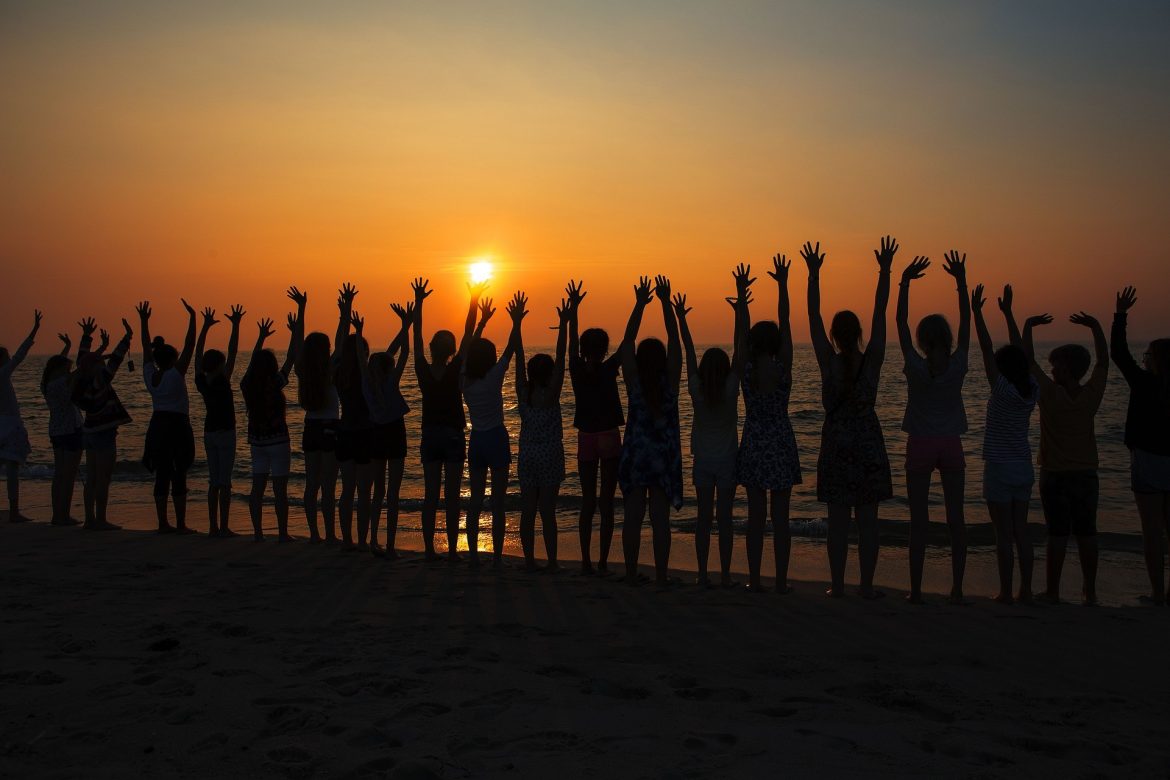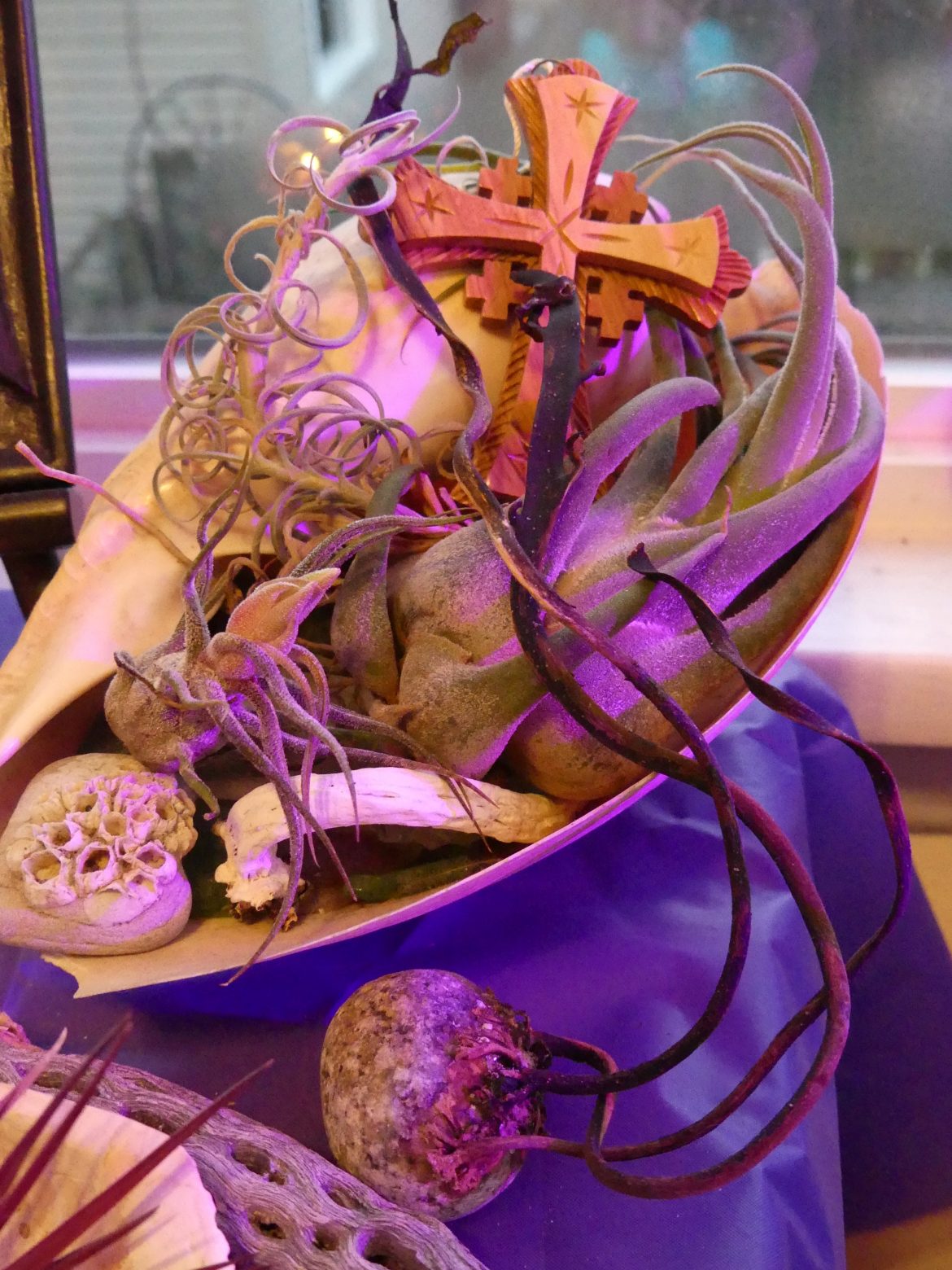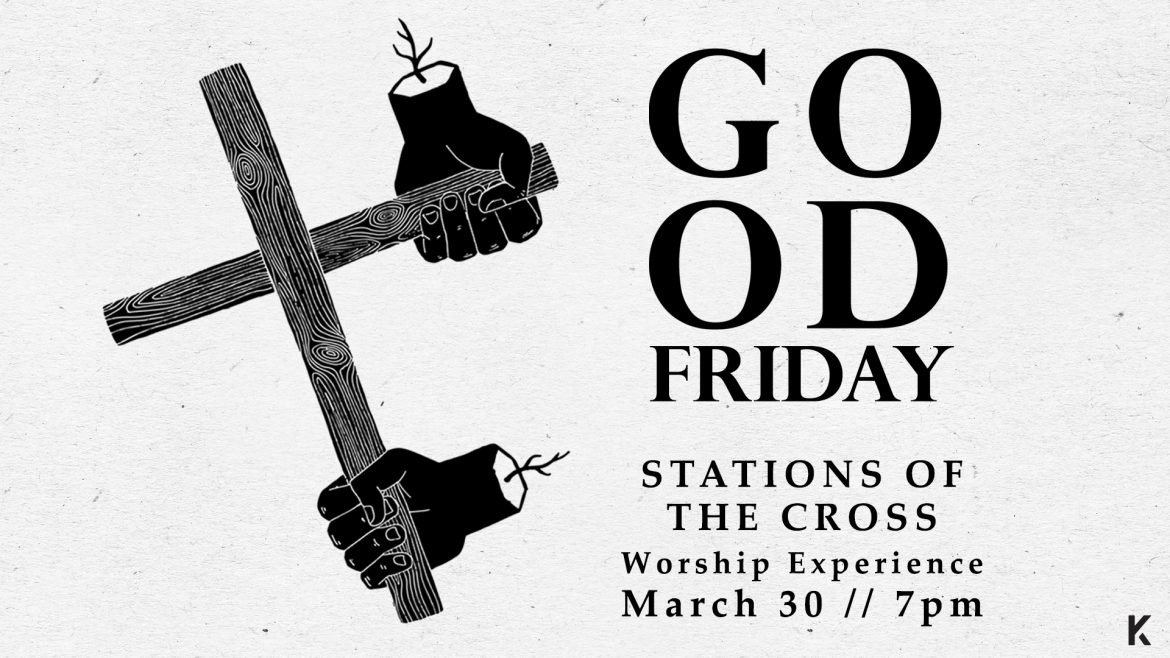By Lynn Domina —
Difference, Glorious Difference
We could have been alike. By “we” I mean all of us. We could have been imagined into being as multitudes of the same creature, each one of us identical, our DNA exactly the same, our appearances distinct only because that one spent more time in the sun, this one ingested less calcium as an infant, the other one failed to catch a ball and so has a scar on his cheek. We could have been called to duplicate each other in a preference for oranges over pears, basketball over football, Who Wants to Be a Millionaire over Jeopardy. Instead, we’re unique, our skin bronze or olive or ivory, our voices rumbling or breezy or hushed, our dominant responses patience or fear or nonchalance.
What was God thinking? Life would be so much easier if we all wore the same size shoe and so didn’t have to spend half a morning wandering from store to store, searching for a pair that was narrow enough at the heel and wide enough at the toes. If our taste buds were all the same, well-meaning friends could stop trying to foist brussel sprouts on us, convinced that in this recipe, we’d come to love them. Ditto tofu. Ditto oysters. And what was God thinking, creating us all so different and yet so opinionated? We argue about baseball teams, cookie recipes, whether the Holy Spirit proceeds from the Father and the Son or only from the Father, daylight savings time, guns, beer, abortion, rock and roll or rap, and who makes the best pancakes. Why didn’t God just create us as more similar and more agreeable?
As a writer myself, as someone who enjoys bringing poems and stories into being, creating something out of—if not nothing, then language alone, I appreciate the pleasure of creation. I like to imagine God’s joy and astonishment every time God brought something new into being—a three-toed sloth, a hippopotamus, a flowering cactus. The color blue and the color green and the color teal. Cinnamon, fennel, turmeric. People with freckles, people who can curl their tongues, people with bushy eyebrows. What diversity I imagine God thinking, what fun. When God called everything good, maybe God was thinking only about morality, but I think God was filled not only with satisfaction but with delight, observing all of creation, the yellow and purple, the light and darkness, the males and females. God called it very good our Bibles tell us, but I think God meant, “This is great!”
But, alas, of course, arguments ensued. Adam, Eve, the serpent, and their short debate followed by that first juicy bite of a Granny Smith. Cain, Abel, the grain, the flocks, Cain’s left hook, Adam’s corpse. If only God had created us to be alike rather than different, maybe we’d all still be living in paradise. Perhaps all this diversity is just a foolish result of a foolish decision.
Or not. Perhaps, as is so often true, we’re the fools. Some of us see difference and feel fear. Some of us feel anger. Some of us feel disgust. Others of us feel surprise or excitement or wonder. Let’s be like those people. God called all of creation good. Let’s receive it that way. Good. Good. Good.
By Idelette McVicker
There are few things as foolish as offering the task of spreading an eternal message—a revolutionary message—to women in a society shaped and ruled by patriarchy.
Women had no position, no place, no authority, no power.
We might even ask: What was God thinking? These women would not have been regarded as credible witnesses. The system around them dismissed their voices—no credibility here. They were nobodies in the eyes of their society. They did not have cultural, religious or political authority to spread a message to the ends of the earth.
The very act of telling women to carry this message, seemed hopeless and ridiculous.
Giving a woman an important message to share in a larger society, would have seemed like a death sentence to that very message. Kind of like a baby boy born during the time of Herod.
But the longer I walk this earth, the longer I know: the HOW matters as much as the what.
How a message spreads, to whom it is given, how it goes out into the world, how we walk with each other, how we talk to each other, how we have meetings, how we create conversations, how we move and flow matter as much as THAT we do these things.
The HOW carries power. The HOW shapes the message as much as the message itself. How matters.
If the HOW matters, was there great purpose in God trusting women with the message first? I believe God speaks through the how here, as much as through the very message itself.
In sending out a message of New Life and Resurrection into the world, God did not choose powerful lines of transmission. First, the message came to us as a baby, through the body of a woman. Then, when that message was crucified, the message of his resurrection wasn’t given to powerful orators and heralds. This message of Resurrection was trusted into the mouths of women.
Is it possible that the Resurrection message was also meant to resurrect the very story of those who carried the message? The carriers of this message of Resurrection needed their own societal resurrection. Resurrection to the story of women silenced, dismissed and diminished in patriarchy. Resurrection to lost dreams, lost hopes, lost power.
The message of Life was in their mouths. Resurrection was meant to reach through history, down the patriarchal lines, proclaiming resurrection to the past and all the way into the future. The One who proclaimed new life out of sin, gave this message also to penetrate and bring resurrection to the graveyards of patriarchy.
Good news for the world, was also good news for women.
Resurrection power was meant for the messengers, as much as for the hearers.
God didn’t just care that a message went out. God designed the story so the lines of transmission became prophetic conduits of the message. The messengers became the message.
But just like the women, whose words seemed like nonsense to some who heard it, the dismissal and ridiculing of Resurrection voices are still happening today.
When a woman tells her story of rape.
When black voices are crying out for resurrection in the justice system.
When a woman speaks up about abuse.
When indigenous voices rise to protect the land.
When LGBTQ bodies long for dignity and honor.
When refugees arrive.
When women are speaking up in hierarchical churches, crying out for ears to hear.
Jesus is still meeting the ones who most long for Resurrection. Jesus is still meeting us in places of death, dismissal and ridicule with this most beautiful and revolutionary message of Resurrection.
May we have eyes to see, ears to hear and mouths willing to carry this message.
__________________________________
Reflect:
- Will I have believed the women who told this ridiculous story of Resurrection 2,000 years ago?
- Where do I need to listen today?
- Who do I need to believe?
- Who are the messengers of Resurrection now?
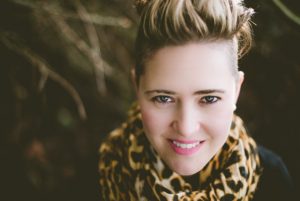 Idelette McVicker is founder and Editor-in-Chief of SheLovesmagazine.com and Dangerous Women Tribe, curating community spaces for women to become strong in their faith and voice, working for peace and justice in the world. Together we learn and practice how we belong to each other.
Idelette McVicker is founder and Editor-in-Chief of SheLovesmagazine.com and Dangerous Women Tribe, curating community spaces for women to become strong in their faith and voice, working for peace and justice in the world. Together we learn and practice how we belong to each other.
As an Afrikaner woman, born and raised in South Africa during the Apartheid years, Idelette’s story has both wrecked her and shaped a longing in her heart for a more free and equal world, alongside a humble passion for anti-racist work.
After training as a journalist in South Africa, she lived in Taiwan where she wrote for daily newspapers. She moved to Canada in 1999 and now home truly is the world. Idelette travels and speaks around the world, seeking and witnessing God’s heart for healed and whole relationship.
Idelette is a writer, immigrant, mother of three and a restaurant wife. She loves Jesus, justice and living juicy.
Connect with her on Twitter at @idelette, Instagram (@idelettemcvicker), Facebook (Idelette) or her personal blog at Idelette.com
by Christine Sine
Yesterday was Palm Sunday that wonderful exuberant beginning to Holy Week which fills us with anticipation and hope. Yet we are in for a roller coaster ride. This week is the centre of our Christian identity. Yet it tugs our emotions in so many different directions. It begins with hope and expectation then plummets to death and despair only to rise again into resurrection wonder. I have written about this from various perspectives in the past, and found myself rereading these posts and thoughts as I began Holy Week this year.
First I reminded myself of how subversive Jesus’ walk through this week was. It does indeed reveal to us the evidence of God’s power which can topple empires and transform worlds. However, as I plant my garden and wait for the seeds to emerge, I also realize there is another story in Holy Week. It is the story of Jesus’s garden walk From Suffering to Resurrection. Adam and Eve’s story begins in paradise but ends in a place of suffering. Jesus walk reverses that. It begins in Gethsemane – a garden of suffering in pain, passes through death into a new creation, a new garden paradise of flourishing life.
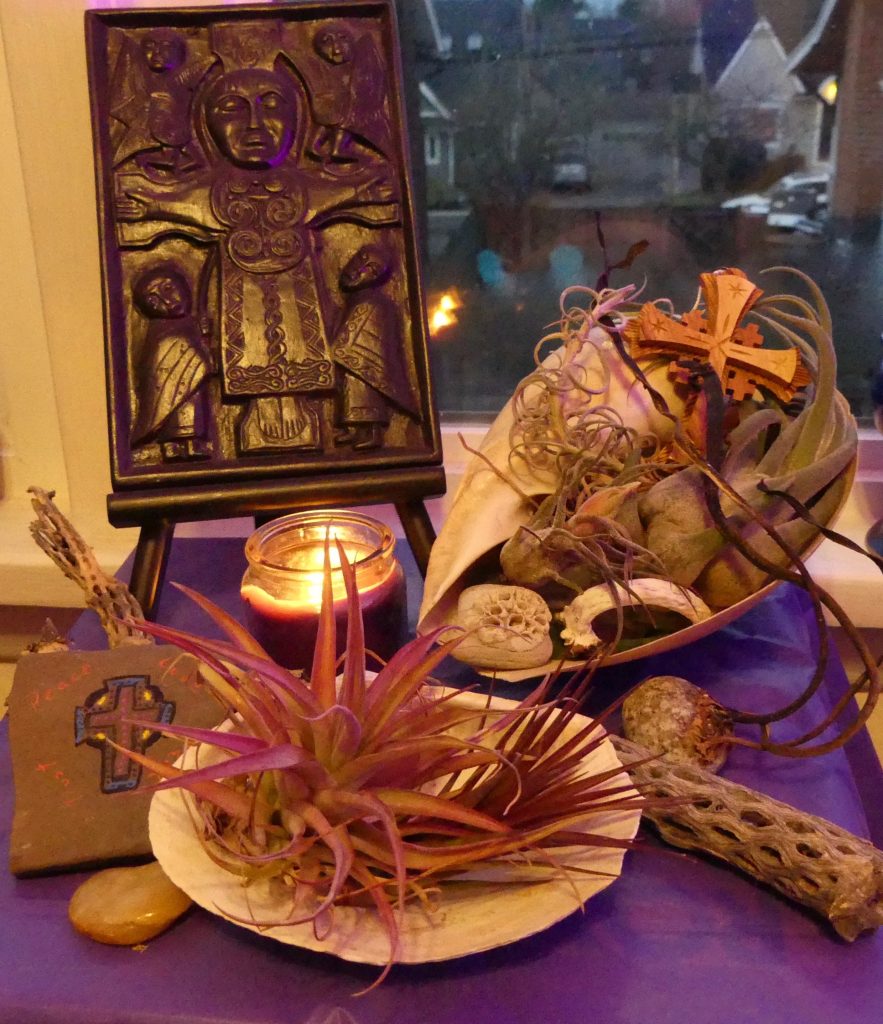
I spent a good bit of time over the weekend designing and reflecting on a special altar for the week, one in which I have woven together themes of life and death – living plants, intertwined with dead branches and kelp still clinging to the rock on which it attached itself in life. there are several crosses on my altar – the most powerful of which is this Celtic cross with Christ surrounded by disciples.
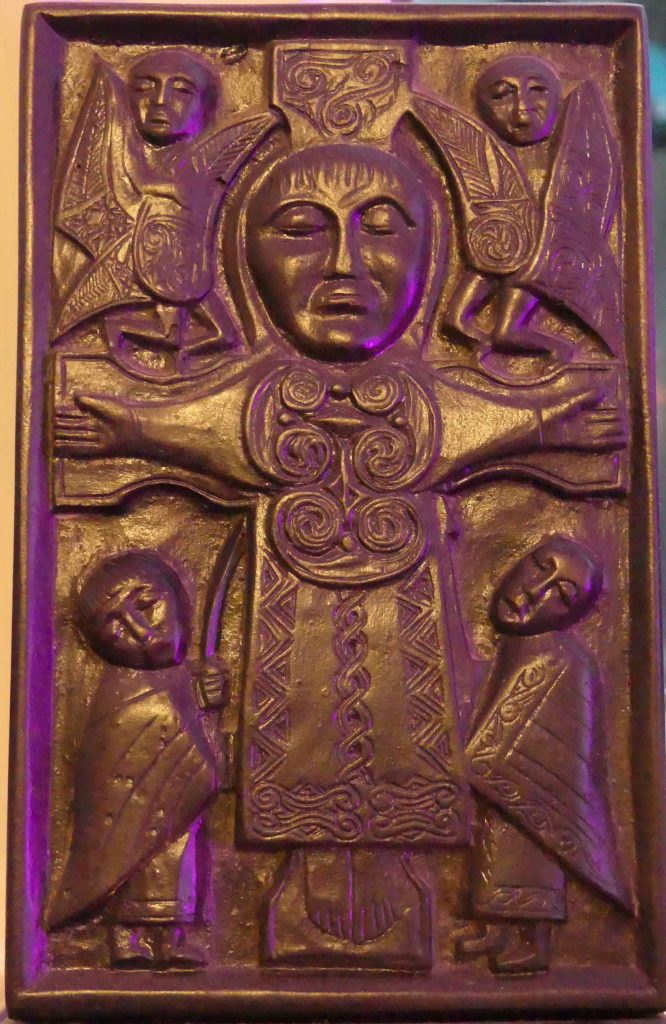 Holy Week begins with a triumphant march, and shouts of Hosanna – help us, save us, set us free but it walks us through a journey in which death and life are intertwined. “unless a kernel of wheat falls to the ground and dies, it remains only a single seed. But if it dies, it produces many seeds.”John 12:24. Without death there can be no life. A seed dies in order to grow and it is fed with black gold, compost made from the death and decay of organic matter. Yet when a seed dies like this it does not produce just one seed but many. God’s pattern of flourishing life begins in death but results in abundance.
Holy Week begins with a triumphant march, and shouts of Hosanna – help us, save us, set us free but it walks us through a journey in which death and life are intertwined. “unless a kernel of wheat falls to the ground and dies, it remains only a single seed. But if it dies, it produces many seeds.”John 12:24. Without death there can be no life. A seed dies in order to grow and it is fed with black gold, compost made from the death and decay of organic matter. Yet when a seed dies like this it does not produce just one seed but many. God’s pattern of flourishing life begins in death but results in abundance.
It seems to me that for many people Holy Week ends on Good Friday but that is not what we should dwell on. When we plant a seed, we don’t mourn and wail, we wait in joyful anticipation for the new life to emerge. Death is necessary for life to flourish. It nurtures fresh and vibrant life.
As we walk through Holy Week, I wonder what our eyes are focused on? What are we willing to put to death so that life can flourish in, around and through us. How willing are we to accept the cost of Easter and look beyond the pain and suffering as Christ did so that life can flourish?
We were in the mood for a celebration. After 3 years of travelling, listening to him teach, trying things ourselves and seeing amazing miracles, at last we were approaching Jerusalem at Passover, crowded with pilgrims all set to welcome the one who we knew so well, the one we knew to be the Messiah. We were exhausted and ecstatic in equal measure: sensing that at last Jesus’ hour had come, that he would be proclaimed Messiah at last, and the horrendous regime of the Romans would be finally ended. So yes, we were in the mood for celebration.
It had seemed shrouded in secrecy at first. That journey for the donkey with its enigmatic secret password. Not surprising, perhaps, with the city turbulent, the people agitated by a complex mix of hope and desperation. It was not lost of them either, the significance of the donkey, fulfilling the prophecy from Zechariah that our beloved Jerusalem would see their king coming on a donkey. Pilate’s war horse was no match for this incredible scene. You could almost hear the unspoken corporate ”AT LAST!”
So shout we did, a whole crowd of us, with others gathering. With every shred of our God-given breath we yelled and hollered: “Blessed is the king who comes in the name of the Lord! Peace in heaven and glory in the highest!” We wanted everyone to understand what this day meant.
At first Jesus seemed to catch our exhilaration. The Pharisees, seeking to crush our joy, sought a rebuke for us from him, but he would have none of it. “Don’t you get it? All of creation is celebrating” he retorted, surprising even us by the scope of what he was implying.
And then he stopped. Still a little raised from the city, he looked slowly across the vista. We thought he was looking at the glorious temple, appreciating its majesty, andso I looked too. But then I glanced at him, and saw a movement I did not recognise at first, and then recoiled in horror when I did. He was weeping. Not delicate tears, but racking sobs, so strong it shook his body and he was barely able to breathe. He was looking, and howling as if from the depths of his soul, as though he could see something we could not, and it was breaking his heart. “If you, even you, had only known on this day what would bring you peace—but now it is hidden from your eyes”, he muttered from a place of pain we could not reach him.
We were shocked to our very core. What kind of entrance was this for a king? I wanted to shake him from this inexplicable grief, remind him what we were here for, but somehow I couldn’t. It was the look in his eyes, as though he could see something, away in the distance of time or geography, that I was not privy to. So I waited, and in time he stood up, and the joyous procession restarted. We were back on track.
We had no idea what the next week would hold.
by Lilly Lewin
I am on the road this week speaking and curating sacred space in Minneapolis. This Music video has been my morning meditation as I have prepared to speak each day. It was filmed in one continuous take! That is amazing! As is the song! May you feel the love and refreshment of God as you listen. Joy and Peace as you begin Holy Week.
By John Birch —

If you’re in Seattle and are looking for a Good Friday worship experience, join Kardia Church Friday, March 30th from 7-9pm. Kardia will be showcasing art from our friend, Scott Erickson who has designed intense and beautiful imagery of the Stations of the Cross. These images will be along side creative worship and prayer stations designed for you to engage in contemplation, enjoy hands-on interactive experiences, visual expressions and through song to walk you through Jesus’ death on the cross. These interactive stations were inspired by our very own Lily Lewin and Hilary Horn.
The Stations of the Cross began as a rememberance that pilgrims would have when they were retracing Jesus’ finals steps in Jerusalem up to the hill where he was crucified. Wanting to share that practice and experience with people who couldn’t make the trip to Jerusalem, they created these stations of meditation that became in itself a tradition. You can find this tradition on the inside of many churches today.
Come and go as you please from 7-9pm as we take space to contemplate Jesus’ death before our celebration on Easter Sunday at Kardia Church in north Seattle / 14054 Wallingford Ave North, Seattle, WA 98133
If you or your church is doing something special in your area for Good Friday, let our readers know by posting a comment below!
As an Amazon Associate, I receive a small amount for purchases made through appropriate links.
Thank you for supporting Godspace in this way.
When referencing or quoting Godspace Light, please be sure to include the Author (Christine Sine unless otherwise noted), the Title of the article or resource, the Source link where appropriate, and ©Godspacelight.com. Thank you!

